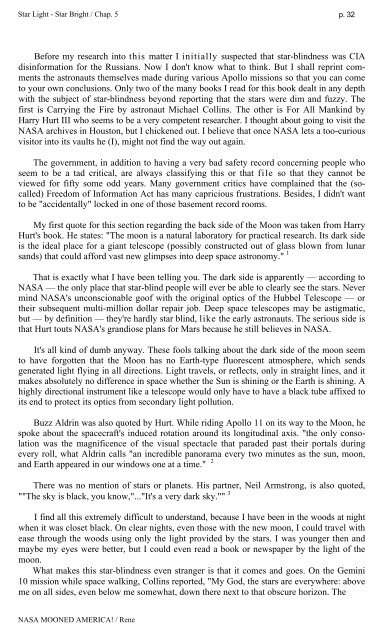Rene-NASA-Mooned-America
Rene-NASA-Mooned-America
Rene-NASA-Mooned-America
Create successful ePaper yourself
Turn your PDF publications into a flip-book with our unique Google optimized e-Paper software.
Star Light - Star Bright / Chap. 5 p. 32<br />
Before my research into this matter I initially suspected that star-blindness was CIA<br />
disinformation for the Russians. Now I don't know what to think. But I shall reprint comments<br />
the astronauts themselves made during various Apollo missions so that you can come<br />
to your own conclusions. Only two of the many books I read for this book dealt in any depth<br />
with the subject of star-blindness beyond reporting that the stars were dim and fuzzy. The<br />
first is Carrying the Fire by astronaut Michael Collins. The other is For All Mankind by<br />
Harry Hurt III who seems to be a very competent researcher. I thought about going to visit the<br />
<strong>NASA</strong> archives in Houston, but I chickened out. I believe that once <strong>NASA</strong> lets a too-curious<br />
visitor into its vaults he (I), might not find the way out again.<br />
The government, in addition to having a very bad safety record concerning people who<br />
seem to be a tad critical, are always classifying this or that file so that they cannot be<br />
viewed for fifty some odd years. Many government critics have complained that the (socalled)<br />
Freedom of Information Act has many capricious frustrations. Besides, I didn't want<br />
to be "accidentally" locked in one of those basement record rooms.<br />
My first quote for this section regarding the back side of the Moon was taken from Harry<br />
Hurt's book. He states: "The moon is a natural laboratory for practical research. Its dark side<br />
is the ideal place for a giant telescope (possibly constructed out of glass blown from lunar<br />
sands) that could afford vast new glimpses into deep space astronomy." 1<br />
That is exactly what I have been telling you. The dark side is apparently — according to<br />
<strong>NASA</strong> — the only place that star-blind people will ever be able to clearly see the stars. Never<br />
mind <strong>NASA</strong>'s unconscionable goof with the original optics of the Hubbel Telescope — or<br />
their subsequent multi-million dollar repair job. Deep space telescopes may be astigmatic,<br />
but — by definition — they're hardly star blind, like the early astronauts. The serious side is<br />
that Hurt touts <strong>NASA</strong>'s grandiose plans for Mars because he still believes in <strong>NASA</strong>.<br />
It's all kind of dumb anyway. These fools talking about the dark side of the moon seem<br />
to have forgotten that the Moon has no Earth-type fluorescent atmosphere, which sends<br />
generated light flying in all directions. Light travels, or reflects, only in straight lines, and it<br />
makes absolutely no difference in space whether the Sun is shining or the Earth is shining. A<br />
highly directional instrument like a telescope would only have to have a black tube affixed to<br />
its end to protect its optics from secondary light pollution.<br />
Buzz Aldrin was also quoted by Hurt. While riding Apollo 11 on its way to the Moon, he<br />
spoke about the spacecraft's induced rotation around its longitudinal axis. "the only consolation<br />
was the magnificence of the visual spectacle that paraded past their portals during<br />
every roll, what Aldrin calls "an incredible panorama every two minutes as the sun, moon,<br />
and Earth appeared in our windows one at a time." 2<br />
There was no mention of stars or planets. His partner, Neil Armstrong, is also quoted,<br />
""The sky is black, you know,"..."It's a very dark sky."" 3<br />
I find all this extremely difficult to understand, because I have been in the woods at night<br />
when it was closet black. On clear nights, even those with the new moon, I could travel with<br />
ease through the woods using only the light provided by the stars. I was younger then and<br />
maybe my eyes were better, but I could even read a book or newspaper by the light of the<br />
moon.<br />
What makes this star-blindness even stranger is that it comes and goes. On the Gemini<br />
10 mission while space walking, Collins reported, "My God, the stars are everywhere: above<br />
me on all sides, even below me somewhat, down there next to that obscure horizon. The<br />
<strong>NASA</strong> MOONED AMERICA! / <strong>Rene</strong>


